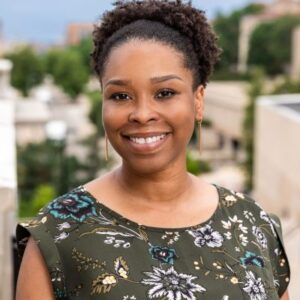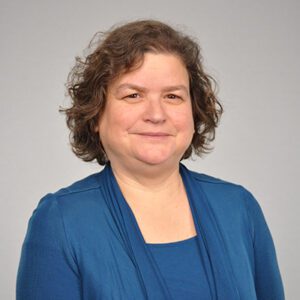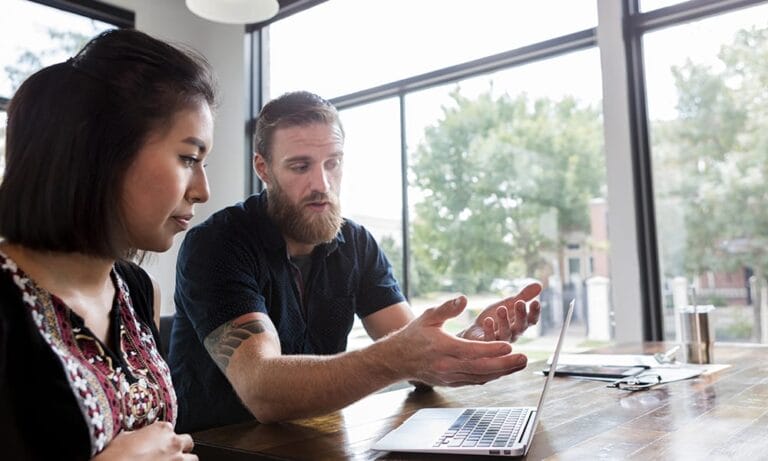
Online academic advising: Support for student success
Getting an online degree doesn’t have to mean going it alone. Online academic advising can help you make connections and feel part of a community of learners. From day one, depending on your choice of schools and programs, advisors can provide a solid support system throughout your online academic journey.
Good online advisors pride themselves on being proactive. It’s easy to feel isolated if you’re learning strictly online, so advisors make sure students feel a sense of belonging. A positive student/advisor relationship encourages online students not only to ask for help and share their struggles but to reach out and celebrate successes.
We talked with two University of Wisconsin–Madison staff about their approach to online academic advising. Karen Thomas is the director of the UW–Madison Office of Online Student Success and Leanne Johnson is an academic and career advisor in that office. Both provide academic and career support for UW–Madison Online students.
Read what they have to say about online academic advising, and then visit The Ultimate Guide to Online Business Degrees to learn more.
As a career and academic advisor, what are some of your goals in helping online students?

Leanne: In general, my main goal is to help students feel supported and connected to campus. I hope students feel like I’m that person they can go to for advice and ideas, or even just to vent if need be.
Karen: Helping online students feel connected is a very important part of online academic advising. From day one through graduation, we are there to help them navigate a variety of issues and challenges. We help students identify and meet goals as students and future leaders – whether they are new or returning. We help them make connections between their learning and real-life experiences. And we assist them as they bridge gaps to create a seamless, exceptional student experience.
What do you hope students get out of academic and career advising?

Karen: I want students to feel like they have a personal connection with someone in the program and that they can go to us with questions, issues or concerns. It’s important that online students feel like they have a place at UW–Madison and that they are more than just a number. Students tell us that it’s great to have someone there to navigate challenges with them and also celebrate their successes!
We hope that timely, accurate and effective online academic advising gives students the ability to make adequate academic progress. They should also know they can always discuss potential career paths and career-related questions and thoughts.
Leanne: We hope students get a solid understanding of degree requirements, how to best sequence classes and how to manage credit load with personal commitments and goals. We also hope they learn to navigate financial aid, veteran benefits and enrollment requirements.
We like to suggest that students think about different time management and study strategies, including how to connect with fellow students. Many of our students come to us with career goals in mind, and we like to have regular check-ins to see if plans are changing. Ultimately, we are helping students to better position themselves for the next steps after graduation.
What advice do students typically seek when they reach out to you?
Leanne: Typically, students come to us to talk about course selection and financial concerns. But they also come to us to discuss personal issues and how those issues can impact their academic success.
Karen: It’s difficult to think about a typical returning adult student in online programs because they are so different, with different needs and life circumstances. We are ready to address any kind of academic or career-related issue that students bring to us. Even if we aren’t able to answer their question or address the issue in the moment, we believe in finding a solution and either directly connecting them to a campus representative or getting back to them with more information.
What resources do you provide students regarding academic success and career options?
Karen: Of course, we have a lot of conversations about upcoming course offerings and planning their academic journey to align with their personal goals and responsibilities. But we also share a variety of resources with them to make this journey go smoothly, such as the student virtual community, university academic support and tutoring services, use of the UW libraries, our McBurney Disability Resource Center, The Writing Center and free access to LinkedIn Learning.
We also provide students with some career resources, such as information on writing resumes and cover letters, jobs and internships, networking and increasing their marketability in any given field. Our UW–Madison Online students have access to UW resources such as LinkedIn Alumni and BadgerBridge – two ways to connect with fellow Badgers.
Leanne: We proactively talk about study skills and time management and encourage engagement with instructors and fellow students. We recommend resources both on campus and online that might help prepare students and support them in class. I try to bring career options into conversations.
Tell us about a time when it was rewarding to be an academic and career advisor.
Leanne: Overall, I find it rewarding to get to know my students. I like to share something with them about previous conversations we have had, so they know I’ve invested in what has been going on in their lives and am doing my best to help them navigate their concerns. Helping them feel I am a safe person who cares about them and then receiving the gift of trust is amazing.
Karen: Those “lightbulb moments” are the most rewarding when working with students. When students are able to really find their passions and make connections between their educational interests and their larger purpose, it’s pretty special to see. I also find it rewarding working with students who see me as part of their team.
A lot of times, being an advisor means that you are “the person” for students. You hear about housing issues, grades, courses, financial challenges, family matters and so much more. Knowing that students trust you in ways that they may not always trust others makes online academic advising a vital part of the overall student experience. I believe that advisors are the magic sauce at colleges and universities.
What advice would you give to students on the best way to work with your advisor?
Karen: I would say it’s best to reach out sooner rather than later, whether you want help addressing concerns or just want a sounding board. It’s always best to nip problems in the bud before they happen. Sometimes students aren’t sure which questions to ask because it’s been a long time since they’ve been in school or they don’t know exactly what advisors do or how they can help. I would tell students that even if you don’t have specific questions, connect with an advisor and have a conversation.
Leanne: I would add that students should be as open as they feel comfortable being with their advisor. Whatever they are bringing to their educational journey – whether it be health problems, family commitments, job concerns – we are here to listen and trouble-shoot as much as we can.
What do you like about being an academic and career advisor?
Leanne: I believe in second and third chances, especially when it comes to education. I also know and understand that life happens. Supporting our returning adult students as they navigate their nontraditional educational journey – that often includes complications as they juggle work, family and other issues – is both challenging and rewarding.
Karen: I really enjoy the wide variety of students we connect with in online academic advising – veterans, single parents, professional athletes, people embarking on second careers or just starting a new career. They bring so many different backgrounds and perspectives, but they share a common goal of earning their degree.
I like the ability to tailor conversations and meet each student where they are, taking time to understand their situations and complex lives. It’s important to us that we provide that safe space where students feel a sense of belonging and the ability to thrive. This gives me great joy.
For more information, see the UW–Madison Online or Office of Online Student Success websites.
Previous Post
Latino Youth Summit previewed in Madison365



